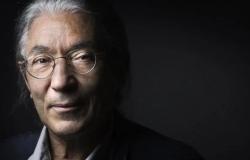(Paris) Forcibly relocating half of the asylum seekers present in Quebec can be done “humanely”, maintains François Legault, who believes he has the support of the majority of Quebecers.
Published at 8:00 a.m.
In an interview given to The Press At the end of his mission in Paris on Sunday, the Prime Minister said he had no regrets about his request for forced relocations despite the controversy that his remarks raised in Quebec.
“I have taken note of the opinions of columnists and opposition parties, but I remain convinced that the majority of Quebecers agree with me on the obligation of results, that the federal government must reduce by half the number of asylum seekers in Quebec,” he said.
I persist and I sign: we continue to ask the federal government […] to go from 160,000 to 80,000 [demandeurs d’asile].
François Legault, Premier of Quebec
And to get there, “there must be a mandatory approach, rather than a voluntary approach, because the voluntary approach did not work,” argued Mr. Legault.
A mandatory approach would violate the Charter of Rights and Freedoms, according to Ottawa. But François Legault believes that it is possible to act with humanity.
“I think it can be done humanely. I don’t want to tell the federal government how to do that, but we can treat a single asylum seeker who has been here for three months and a family who has been with us for three years differently,” he said. “It’s up to the federal government to find ways. But one thing is clear, we cannot keep 160,000 asylum seekers in Quebec. This poses problems on the service side [publics] and that poses problems for the future of French. I am convinced that the majority of Quebecers agree with me. »
As for the refusal of certain provinces to welcome asylum seekers, “that’s Mr. Trudeau’s problem,” he replied. “I don’t want to get involved in the solutions. » Alberta, Nova Scotia and New Brunswick are recalcitrant, while Manitoba and Newfoundland and Labrador are more open.
3 objectives achieved
François Legault considers having achieved the three objectives he set for this five-day mission to Paris.
Immigration
“On asylum seekers, I wanted to see if there were other countries which saw the same problems as us with the explosion in the number of asylum seekers. And I had confirmation, among others from France, that, yes, they see this as a problem. However, they are much ahead of Canada. We in Canada, it takes three years to make a decision [d’accorder ou non l’asile] while in France, they went from three and a half years to four months. And Prime Minister Michel Barnier told me that four months is far too long, that we must look in Europe for other ways of reducing the number of asylum seekers. »
More French in digital
On the issue of the place of French in the digital universe, “I wanted to have an opening from UNESCO and the OIF ]International Organization of the Francophonie]and I got some. opening. ]In the closing declaration of the OIF Summit]there are two paragraphs on this, but we want to go further than that. We really want to enter into negotiations with the big digital players, and that’s what we’re asking for. We are going to wait for the recommendations from UNESCO which will arrive at the beginning of 2025. I hope the same thing for UNESCO too, that it eventually becomes concrete, so that there are negotiations with Spotify, Netflix and others. » At the invitation of the Government of Quebec, the Ministers of Culture of the member states and governments of the OIF will meet in Quebec in May to move the issue forward.
Economic development
“I am very satisfied. As expected, many French companies want to invest in Quebec to have the clean electricity that we have. The issue is that we don’t have any available, but this confirms that we are in the right direction with our plan to double Hydro-Québec” in terms of electricity production. During his mission, François Legault met bosses from Alstom, Ubisoft, Thales and Safran.






